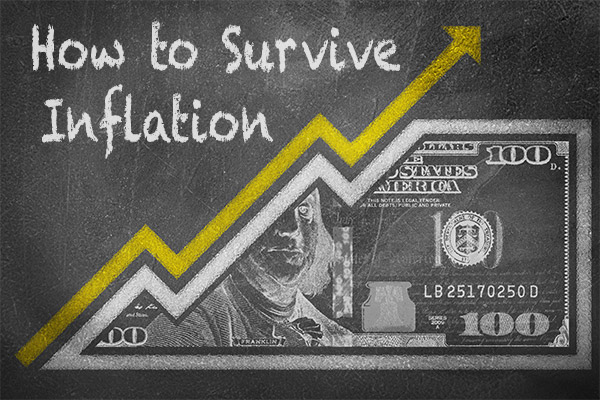With a nod to Mark Twain, inflation has replaced the weather as the thing everyone talks about it, but nobody seems to do anything about it.
Until now.
Not that we have any macro solutions. With inflation running well above 8% (a budget-walloping 40-year-high), we shall leave the wrangling about economic philosophy — what’s causing it, who’s to blame, and how best to cure it — to those commanding higher pay grades.
Instead, let’s tackle what every day American consumers can do to survive this historic crunch while waiting for inflation to be curbed, or simply burn itself out.
In simple terms, 8.6% inflation — the official national rate; your experience may vary — means the same basket of goods you purchased last year for $100 now costs $108.60. But don’t try that arithmetic at the gas pump, grocery store, or when it’s time to renew your lease.
According to a Moody’s Analytics analysis, the average American household is spending as much as $460 per month more for the same stuff as last year.
Oooouuuccchhh!
“It’s also a tough ask for people to psychologically shift [their thinking about] what things should cost,” says CPA Jason Cherubini, who is, among a variety of things (including filmmaker), a Baltimore-based business administration lecturer at Stevenson College. “What things are costing now may not line up with what in their mind things could or should cost. … But it doesn’t change the reality.”
Once we’ve overcome our denial, how do we cope? Budgeting? Cutting expenses? Boosting income? Tapping emergency reserves? Paying off debt? Revising investments and savings? At the micro-economic (household) level, surviving dream-crushing levels of inflation unseen in 40 years requires an all-of-the-above strategy.
Budgeting
Unless you’re Tom Cruise or you’ve just been drafted in the first round of the NBA draft, budgeting isn’t fun. Ever. Long story short, even in the best of times, too much money goes out; not enough money comes in.
“It’s easy to tell somebody you need to budget better,” says Einat Steklov, New York-based attorney and founder of Kashable, an online lender that offers personal loans as an employee benefit. “But it’s really hard to look at those expenses — the known, predicted expenses versus unexpected life events that happen to you. Nobody plans on their car engine dying.”
OK, so budgeting isn’t a party. But mastering your money is key to financial happiness that lasts.
You can go old school, with pencil and legal pad, listing every dollar that comes in and every dime that goes out. Or download — and use — reliable household budgeting software, such as You Need a Budget, Honeydue, Mint, or Goodbudget.
Try, as well, to approach budgeting with a fresh attitude. Change your mindset, says Jerremy Newsome, Nashville-based CEO of Real Life Trading.
“The very, very first thing most individuals do in a budget is they pay their bills,” Newsome says. “Now, although that’s not a bad thing … you start by subconsciously putting other people at the forefront of your [life]. My suggestion for most people is when they do their budget, actually start the other way:
“How much money can you pay yourself first and treat yourself as your main priority in life.”
Either way, establishing a realistic foundation of your current financial status is the best way to establish your footing against the raging inflation storm.
Cutting Expenses: Go after the Small Stuff
If you could cut your rent or mortgage payment in half, that might solve everything. In the short term, however, that’s not likely to happen. Instead, says Cherubini, go after unnecessary spending, even “frivolous expenses.”
“Things that people may have been able to skirt by on, they had a little extra fat in their budget and their take-home, they’re starting to see that just shrink,” he says.
To combat that shrinkage, Cherubini suggests, have a tough conversation with yourself: “Is this something I need? Is this something I’m getting the value out of? Or is it money that I can cut without drastically changing the quality of my life? … for most people, if they actually look at it, they can see that there’s a lot of expenses. They can cut and they’re not even gonna notice.”
Searching for low-hanging fruit? Address your “subscription addiction,” Steklov says. Divorce yourself from autopilot payments for streaming services, magazines, gym memberships, and the like. You can track these down yourself, or you can employ subscription-tracking tools such as Truebill, Marcus Insights, or Trim.
“Be smart about it, be realistic,” she says. “What is it that you can cut quickly? Don’t overlook the small expenses. That might be might be easier than cutting big things.”
Other ways you can cut expenses during inflation include:
- At the grocery, give store brands a try. They’re cheaper, and their quality might astonish you.
- Consider weaving meatless meals into your family’s menu.
- Join your grocery’s shopper-loyalty plan; some programs automatically load digital coupons for things you already buy.
- Study the store’s weekly sales flyers.
- Organize your errands to cut down on driving. If your car doesn’t absolutely demand premium, try stepping down a grade.
- Can you work remotely? Discuss a hybrid schedule with your boss to cut your weekly commuting costs.
- Shop your necessities: mobile phone and internet plans, insurance policies (home, auto, health), banking services.
- Look for cash-back opportunities on things you must buy. If you’re an online shopper, install a browser extension such as Rakuten, which provides rebates at a wide variety of retailers.
Do not rule out being a low-level commodities trader, Cherubini says. Persuaded energy prices will only rise in the foreseeable future, he’s already locked in his household’s heating oil needs for the winter ahead. Even if you have to tap your emergency fund, getting today’s price for future necessities is a wise investment, he says.
“For some purchases,” he says, “you can’t be defensive with your cash.”
Boosting Income: Ask for a Raise
Where you work now may be the fastest, most efficient way to increase your income. With job openings and voluntary departures (quitting) remaining near all-time highs in the summer of 2022, and layoffs holding at historic lows as employers scramble to keep their workforce in place, workers continue to have uncommon leverage.
Prepare yourself for the talk. Know and be able to emphasize the contributions you have made: your productivity, knowledge of the company, goals achieved, revenues boosted.
Make certain you have reviewed the salary data for your role and job description. Could you earn more elsewhere? It’s unwise to threaten to leave without having a well-planned strategy, but pointing out the truth of the marketplace is fair game. Moreover, you may want to let the boss know what you know: The costs of finding, hiring, and getting your successor up to speed might be far more expensive than meeting your pay increase request.
Just the same, polish your resume, in case push comes to shove.
Meanwhile, it may be time to scratch that side-hustle itch. The gig economy remains very much with us, and picking up extra cash might be no more than a mouse click away.
If you have expertise gained through education, experience, practice, or even a hobby, you may have marketable freelance skills. This applies especially to seniors who’ve lately discovered their retirement financial plan needs some patchwork.
“Think about most small businesses,” Cherubini says. “Bringing on someone with a high level of experience would be cost-prohibitive, but they want that expertise in two-hour or eight-hour chunks or for one particular project.
“On the flip side, you have the person who has built their career that has their house paid for, that doesn’t want to be stuck in a job 30 hours a week, they wanna be able to travel and go see the kids, the grandkids, or just go hit the golf course every morning.”
Everybody wins.
Do not overlook resources right under your nose, Newsome says. Does your home, condo, or apartment have an unused bedroom? Yes, you could consider bringing in an expenses-sharing housemate, but suppose you could rent the same space a few hours at a time to a variety of clients?
No, not for that. Dress up the room to make it attractive for photo shoots. Or invest in turning it into a sound studio for do-it-yourself musicians, podcasters, or voice actors. Or create an office for your side-hustle business.
Once the space becomes the site of commerce, Newsome notes, it’s not just a profit center, it’s an income tax deduction.
Tapping Emergency Reserves
This is, almost without exception, a big, fat, NO.
Raiding your emergency fund simply to maintain the posh lifestyle to which you have become accustomed is an abysmal strategy. Keeping Showtime Anytime may be important, but it’s not likely to meet the definition of a crisis. Remember Steklov’s warning: Nobody picks the day their car engine goes kaput.
Siphoning off a bit of your emergency reserves makes sense only under Cherubini’s strategy: You’re locking in today’s price of a future absolute necessity. Even then, he says, you must plan to replace those funds in a timely fashion.
The same goes for accessing your 401(k) or IRA funds.
“You’re liquidating your future!” Steklov says. “There are ways to protect yourself from inflation: reducing expenses, being more realistic on what you make.”
Paying Debt Down (or Off)
As the Federal Reserve raises interest rates, so do rates on revolving credit. This is among the chief reasons it’s an awful idea to attempt to weather high inflation by putting recurring expenses on a credit card and worrying about them later.
For those carrying balances, your interest rates already are creeping from high to astronomical. The average rate on a new credit card topped 20%, the first time that’s happened since Lending Tree began its tracker in 2018. For more than 50% of consumers who nurse balances from month-to-month, their ongoing interest rate is a tick above 16%.
Paying debt down, or off, is always a good scheme, but never more than now. Ways to achieve the goal include:
- Debt-consolidation personal loans, which, even now, can be had for rates a half to a third as high as credit card rates.
- Zero-interest balance-transfer cards.
- Cash-out home refinance loans.
- Consulting with a nonprofit credit counseling agency, where you’ll get free, no-obligation advice about the best ways to shore up your household finances.
Revising Investment/Savings Strategies
Among the best ways to adopt the Newsome Maxim — pay yourself first — is by stashing money into your company’s 401(k). If your employer offers a match, invest at least to take full advantage of that.
If your budget is still in the black after meeting the match and your investing horizon is well in the distance, sock away even more, especially while the stock market is well off its historic highs. Historically, the S&P 500 index returns 10% annually; the latest pullback suggests active investors will enjoy substantial gains.
If you have a bundle of cash beyond your emergency fund, cash you don’t need to make your budget work, consider TIPS, or Treasury Inflation-Protected Securities. The principal of these government bonds rises or falls with inflation/deflation, based on the consumer price index.
As an alternative, consider a Series I bond, a federally backed instrument (endorsed by personal financial expert Suze Orman) whose interest rate varies with inflation. Through October, the annualized rate on an I bond is a record 9.62%.
Caveat emptor: You have to hold the bond for at least one year. If you cash out before five years, you lose the previous three months of interest.
Other Strategies and Tactics
- Have a fresh look at your employer’s benefits guide. You may be missing out on any number of company-subsidized perks, from gym memberships and child care to financial planning and discounts on entertainment, dining out, car buying, and even tuition reimbursement.
- Shrink your home’s energy bill. Find out whether your state or electric company offers free energy audits. Easily cured inefficiencies might be identified, and/or you may qualify for state-funded programs offering rebates or tax credits for installing more efficient appliances. Meanwhile, turn off lights. Readjust the thermostat a degree or two (warmer in the summer, cooler in the winter).
- Hold off on home improvements until materials prices cool. Focus only on critical repairs or upgrades.
- With airlines and lodging prices surging, consider a summer staycation enhanced by new sporting goods, camping gear, or other recreational equipment, the prices of which have held fairly steady.
“So much of what’s important in looking at an inflationary environment is the same as always,” Cherubini says. “It’s making sure you know where your money is going. It’s making sure you’re not wasting money, you have a plan moving forward, and you have a plan for the unexpected things. … You just have to understand the value of money is rapidly changing.”
Sources:
- Barrabi, T. and Lungariello, M. (2022, June 10) Inflation costing Americans an extra $460 per month, analysis says. Retrieved from https://nypost.com/2022/06/10/inflation-costing-americans-an-extra-460-per-month-analysis/
- Fox, M. (2022, March 14) Inflation is costing U.S. households nearly $300 more a month. Here’s how to adjust your budget. Retrieved from https://www.cnbc.com/2022/03/14/inflation-is-costing-us-households-nearly-300-more-a-month.html
- Nielo, D. (2021, January 18) 6 Apps to Help You Trim Down Subscriptions — and Save Money. Retrieved from https://www.wired.com/story/6-apps-cancel-subscriptions-save-money/
- Lake, R. and Foreman, D. (2021, December 28) How To Budget For Inflation And Higher Prices. Retrieved from https://www.forbes.com/advisor/banking/how-to-budget-for-inflation/
- Adamczyk, A. (2022, May 26) Inflation is busting everyone’s budget. Try these 7 money-saving strategies. Retrieved from https://fortune.com/2022/05/26/ways-to-protect-your-money-from-inflation/
- Iacurci, G. (2022, June 1) The job market is still hot — for now. Retrieved from https://www.cnbc.com/2022/06/01/the-job-market-is-still-hot-for-now.html
- Kenkare, P. (2022, June 17) Ask for a Raise the Right Way: 7 Expert Tips to Actually Getting One. Retrieved from https://www.cnet.com/personal-finance/ask-for-a-raise-the-right-way-7-expert-tips-to-actually-getting-one/
- Schulz, M. (2022, June 15) Average Credit Card Interest Rate in America Today. Retrieved from https://www.lendingtree.com/credit-cards/average-credit-card-interest-rate-in-america/
- Reinicke, C. (2022, June 22) Average credit card interest rates have topped 20%. Here’s how to pay down that debt fast. Retrieved from https://www.cnbc.com/2022/06/22/how-to-pay-down-credit-card-debt-with-a-20percent-interest-rate.html
- Glantz, J. (2022, April 22) I asked financial planners how to protect my cash during inflation, and got 5 smart pieces of advice. Retrieved from https://www.businessinsider.com/personal-finance/changes-money-right-now-survive-inflation-2022-4
- Wolfson, A. (2022, June 15) With inflation at a 40-year high, 5 financial pros share how to invest and save during times of high inflation. Retrieved from https://www.marketwatch.com/picks/inflation-is-at-a-40-year-high-10-tips-from-the-pros-on-how-to-invest-and-save-during-times-of-high-inflation-01644507163
- Fox, M. (2022, June 23) Suze Orman: Series I bonds are the one investment every person should have right now. Retrieved from https://www.cnbc.com/2022/06/23/suze-orman-i-bonds-are-the-one-investment-everyone-should-have-right-now.html
- Bell, L. (2022, March 11) Beyond the 401(k): Can’t Miss Unique Employee Benefits. Retrieved from https://www.ally.com/do-it-right/life/unique-employee-benefits/
- Hallett, S. (2022, May 19) How to survive inflation, according to 5 financial planners. Retrieved from https://www.businessinsider.com/personal-finance/pfi-newsletter-financial-planners-survive-inflation-2022-5
- Ballentine, C. And Wells, C. (2022, May 11) How to Save Your Budget With Inflation Running Hot. Retrieved from https://www.bloomberg.com/news/articles/2022-05-11/how-to-survive-inflation-avoid-surging-plane-tickets-to-save-your-budget


















